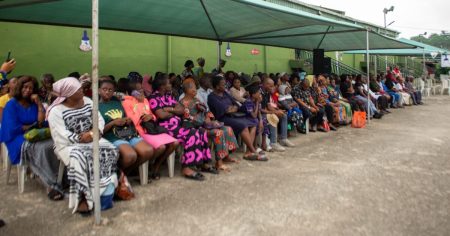This incident highlights the complex issue of foreign nationals engaging in illegal activities within India, specifically focusing on the case of two Nigerian individuals apprehended in Hyderabad for overstaying their visas and suspected involvement in drug-related operations. The arrests raise concerns about the effectiveness of visa regulations, the monitoring of foreign nationals within the country, and the potential security implications of such illicit activities. The background of each individual reveals different pathways to their current predicament, demonstrating the diverse nature of this problem. Aful Clement, having entered on a business visa, had a prior criminal record in India, including a conviction for cheating, further complicating his legal status. Lazarus Favour, on the other hand, arrived on a student visa, raising questions about how he became involved in alleged drug offenses. Their presence in Hyderabad, after relocating from Bengaluru, and their suspicious behavior in the Tolichowki area, attracted the attention of law enforcement officials.
The arrest of these two individuals underscores the challenges faced by Indian authorities in managing the presence of foreign nationals within the country. The fact that Clement overstayed his visa for an extended period, even after a prior arrest and conviction, points to potential loopholes in the system. It raises questions about the robustness of visa enforcement mechanisms and the ability of authorities to track individuals who have violated visa regulations. Furthermore, the suspected involvement of both individuals in drug-related activities adds another layer of complexity, linking immigration violations to potentially more serious criminal enterprises. The apprehension of these individuals, even without the recovery of drugs at the time of arrest, suggests that law enforcement agencies are actively monitoring and investigating suspected criminal activities within the foreign national community.
The incident also brings into focus the importance of inter-agency cooperation in addressing these complex issues. The Hyderabad Narcotics Enforcement Wing (H-NEW), responsible for the arrests, is coordinating with the Foreigners Regional Registration Office (FRRO) to facilitate the deportation process. This collaborative effort demonstrates the need for a unified approach involving different government bodies to effectively manage immigration, enforce visa regulations, and address criminal activities involving foreign nationals. The deportation process itself can be intricate and time-consuming, involving legal procedures, verification of identities, and coordination with the relevant embassies or high commissions. The success of such endeavors relies heavily on the smooth functioning of inter-agency mechanisms.
Beyond the immediate legal ramifications for the individuals involved, this case has broader implications for India’s national security. The authorities’ assertion that the activities of Clement and Favour posed a threat to national security underscores the potential dangers associated with unchecked illegal activities by foreign nationals. Drug trafficking, in particular, can have far-reaching consequences, including fueling organized crime, undermining public health, and destabilizing communities. The connection between drug-related offenses and national security highlights the need for robust law enforcement efforts and effective border control measures to prevent the entry and operation of such criminal networks.
This incident also raises questions about the broader context of Nigerian nationals in India. While it is essential to avoid generalizations and recognize that the vast majority of Nigerian citizens in India are law-abiding individuals, the involvement of some in criminal activities creates negative perceptions and can contribute to stigmatization. This underscores the importance of balanced reporting and avoiding generalizations based on the actions of a few individuals. Furthermore, it necessitates fostering positive relationships and understanding between different communities to prevent prejudice and promote social harmony. Open communication and collaboration between law enforcement agencies and representatives of the Nigerian community in India can play a crucial role in addressing such issues effectively.
In conclusion, the arrest of these two Nigerian nationals in Hyderabad serves as a reminder of the ongoing challenges related to immigration, visa enforcement, and the potential involvement of foreign nationals in illicit activities. It highlights the need for strengthened regulatory mechanisms, improved inter-agency coordination, and proactive law enforcement efforts to address these issues effectively. Moreover, it emphasizes the importance of nuanced understanding and avoiding generalizations about specific communities while working towards fostering positive relationships and addressing the root causes that can contribute to such situations. The focus should be on comprehensive strategies that encompass both security concerns and the integration and well-being of law-abiding foreign nationals within Indian society.














